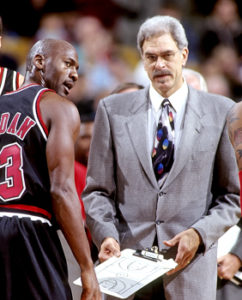Book Rec: Sacred Hoops
The Chicago Bulls dominated the ’90s not solely because Michael Jordan. Phil Jackson applied a philosophy and created a oneness that transcended basketball.
You probably know who Phil Jackson is. He earned 11 championship rings as a coach, the most in NBA History. This post is about his book, Sacred Hoops: Spiritual Lessons from a Hardwood Warrior. I first read this book six years ago. It gave me a deeper appreciation of applied philosophy, meditation, and coaching.
 While Sacred Hoops covers Phil Jackson’s background growing up in Montana in a deeply religious household and winning an NBA title as a player with the New York Knicks, it focuses on his time coaching the Chicago Bulls to their first three championships from 19991-93. At times, he comes across as an old man yelling, “get off my lawn.” But, overall, it’s a quick, enjoyable, and insightful read, especially if you like sports—even more so if you’re a Michael Jordan fan.
While Sacred Hoops covers Phil Jackson’s background growing up in Montana in a deeply religious household and winning an NBA title as a player with the New York Knicks, it focuses on his time coaching the Chicago Bulls to their first three championships from 19991-93. At times, he comes across as an old man yelling, “get off my lawn.” But, overall, it’s a quick, enjoyable, and insightful read, especially if you like sports—even more so if you’re a Michael Jordan fan.
After growing up in Montana with fundamentalist Christian background, Jackson learned about Zen in college. He played both baseball and basketball as a release for his energy. He threw the best game of his life when he applied breathing techniques and repeated positive statements to himself during his performance. He realized the hidden power of the mind. He then majored in psychology, philosophy, and religion (I minored in one of those—yay for me!).
You might enjoy Book Rec: But What If We’re Wrong?
The Chicago Bulls. Back to Back to Back.
Phil Jackson became head coach of the Chicago Bulls in 1989 with the goal of winning a championship. He infused Christian principles, practiced Zen, and instilled teachings of the Lakota Souix Native American tribe. The team room had Lakota totems, a Crazy Horse painting, and other symbolic objects to reinforce the vision of a journey within the players’ minds. He emphasized the power of oneness and selflessness to achieve a collective goal.
I always heard about the “Triangle” offense during NBA broadcasts but never really knew what it was. Jackson describes it as the embodiment of his beliefs. Until this point, the NBA played power basketball. A point guard brought up the ball. He passed it to the big guy, who made a move to the rim or passed it to a wing. The wing would shoot or drive to the basket. This style was stagnant and predictable. The triangle involved constant movement. Coaches rejected the triangle because it felt more suited for college. The truth was, “the team had a Jordan addiction—a dependency on Michael’s other-worldly creativity. Teammates often stood still and watched him. He was ‘Michelangelo in baggy shorts.’” Jackson was convinced the triangle could work for the Bulls. The system required thinking and moving in unison. Set plays didn’t exist; it relied on catching the defense overextended and off-balance. “The strength of the triangle is that it’s based on Taoist principle of yielding to an opponent’s force to render him powerless. Be savvy enough to turn power against him. No need to overpower when you can outsmart.”
The Zen Master
The triangle required cohesion among teammates. Jackson instilled unorthodox activities that earned him the nickname “Zen Master.” The team meditated together in the locker room. Jackson assigned books for each player to read. He passed out a handbook of ethics, a “modern-day Ten Commandments,” which the team discussed. He often didn’t call timeouts during games because he wanted the players to solve problems on their own. During timeouts, he asked the players to breathe and visualize a secure place. Imagine how groundbreaking this was! These things weren’t part of traditional masculinity. I cannot overstate how incredible this is. As a guy, “manhood” and masculinity is such a touchy subject. No man wants to talk about it, and they don’t want anything to challenge it—it’s our biggest fear. Phil Jackson was a pioneer.
I think it’s too easy to attribute Phil Jackson’s success to the fact he had Michael Jordan—and, later, Kobe and Shaq. At the highest level of money and ego, he guided groups of individuals to achieve a collective goal. That’s leadership. He made a point to understand each player’s reality without casting judgment or throwing tantrums like most coaches. He included everyone and gave each a purpose. That’s inspiring.
I think after reading Sacred Hoops, you’ll gain a deeper appreciation of Phil Jackson’s leadership style. I bet you’ll also be more interested in mindfulness and how you can apply it to your own life—I know that’s the case with me. Lastly, you’ll have more knowledge about the ‘90s Bulls, which is always beneficial.
